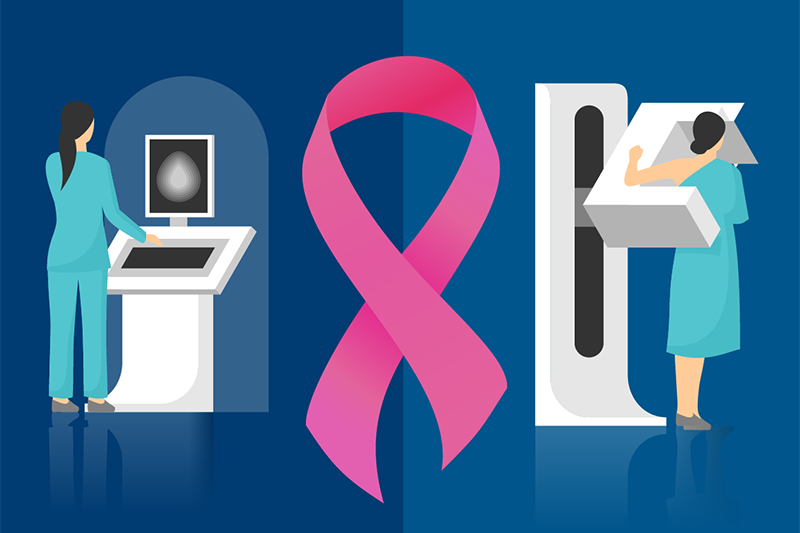Dr. Parodi shares how the mission to make health care better, smarter, and more accessible is never more important than now.

How value-based care improves breast cancer survival rates
Maria Ansari, MD, FACC
Recent reports from the American Association for Cancer Research show deaths from breast cancer in the United States continue to decline. However, more young women are being diagnosed than ever before. As we observe Breast Cancer Awareness Month, we must take a careful look at these developments and how we can properly address this increase in diagnoses.
The facts are clear. Early detection of breast cancer remains the most powerful way to save lives. The American Cancer Society reports a 99% five-year relative survival rate when breast cancer is caught in its earliest stages. But early detection isn’t just about the availability of screening tools. It’s also about ensuring tools are used effectively, consistently, and equitably with all patients.
Related value-based care story: Drs. Ansari and Davidoff on ways to advance value-based care
Why value-based care improves outcomes and the patient experience
I’m especially proud that at The Permanente Medical Group, our physician-led, coordinated health system is at the forefront of improving comprehensive care for patients facing breast cancer. A 2023 study published in The Permanente Journal found that Kaiser Permanente patients experience better five-year survival rates for certain cancers, including breast cancer, compared to national averages from the National Cancer Institute’s Surveillance, Epidemiology, and End Results Program. This is a testament to the strength of our value-based cancer care model, which prioritizes both clinical excellence and the patient experience by focusing on prevention, genetic counseling to understand risks, proactive screenings, early treatment, recovery at home for mastectomy patients, and superior outcomes.
Related cancer care story: An integrated care approach to genetic testing and counseling
We recognize that every woman’s journey with breast cancer is unique. Our approach reflects this understanding, taking into account family history, medical history, and lifestyle. Our advanced electronic health record system helps create customized screening schedules with timely reminders for a personalized approach that not only improves outcomes and efficiency but also fosters a deeper connection between the patient and their care team.
As part of our value-based care approach to treating the whole person, we are committed to reducing patients’ anxiety by expediting screening results and by quickly helping each patient understand their diagnosis, next steps, and treatment plan.
How AI supports accurate and efficient breast cancer detection
We’re also incorporating the latest technology to enhance treatments and assist physicians.
Artificial intelligence (AI) tools help us assess which patients might need an additional level of care if they are at risk for breast cancer. Ainsley Maclean, MD, chief medical information officer and chief AI officer for the Mid-Atlantic Permanente Medical Group, points to the benefits of leveraging AI in breast cancer screenings in a recent Forbes article.
Related breast cancer story: Dr. Maclean on using AI to improve breast cancer detection
Examples include helping to identify cancers not detectable by the human eye, providing a second review of radiologists’ conclusions, and improving work efficiency in areas where there may be a shortage of radiologists. We also found that employing AI to analyze patients’ historical mammograms is 60% more accurate than reviewing traditional risk factors. While this technology has helped transform the detection of breast cancer care, it’s important to note that it functions as a tool that supports and enhances physicians and clinicians in their work.
Why a focus on health equity matters
Our integrated health system prioritizes culturally responsive care and eliminates care gaps. For example, offering interpreter services, including sign language, for our patients can help them make informed decisions about their own care journey. And employing physicians and care team members with diverse backgrounds who understand and respect cultural differences helps prevent misunderstandings and build patient trust. These interventions reduce inequities in care and are simply the right thing to do.
Related health equity story: How value-based care enhances equity, inclusion, and diversity
Convenient access to screenings and care — like expedited mammogram results — reduce the need for additional appointments. Proactive measures like this save time and money and are especially valuable to women who do not have ample paid sick leave.
This month, and throughout the year, I urge all physicians to talk to their patients about breast cancer screenings and the importance of prevention. We know that timely screenings and equitable access to care save lives so let’s work together to lead the charge for all women.
Maria Ansari, MD, FACC, is CEO and executive director of The Permanente Medical Group and president and CEO of the Mid-Atlantic Permanente Medical Group. Dr. Ansari is also co-CEO of The Permanente Federation.


